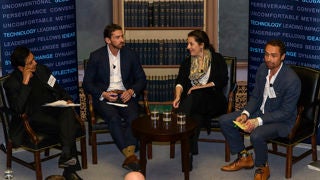
“Being an NSF IUCRC significantly enhances the national and international standing of the center,” says Ophir Frieder, director of Cyber SMART and professor in the Department of Computer Science. “It is a major achievement that Cyber SMART is the first multi-discipline cyber IUCRC, especially because a cross-discipline approach to cyber is a major new focus for the NSF.”
In addition to Frieder, the principal investigators of Cyber SMART include Eric Burger, research professor of computer science; James Giordano, professor in the Departments of Neurology and Biochemistry; and Shin’ichiro Matsuo, research professor of computer science; and Clare Sullivan, visiting professor at Georgetown Law and executive director of the center.
‘Complementary Abilities’
The IUCRC designation also establishes a new additional center site at the University of Notre Dame – the first of a number of additional sites Cyber SMART plans to establish across the United States and internationally.
“By adding new sites with additional complementary abilities, Cyber SMART increases its overall multidisciplinary expertise and collaborative research capability,” says Sullivan.

‘SMART’ Cyber Research
Established in 2019, the center’s name reflects its multidisciplinary approach and the five core elements covered in all its research: science, management, application, regulation and training (SMART).
Cyber SMART has specific capabilities in law, economics, management, neuroscience, psychology and ethics in addition to its world-leading computer science expertise in distributed ledger technology, digital identity and security.
“By combining computer science and all the relevant NSF social and behavioral sciences, Cyber SMART is able to develop solutions that are legally and operationally effective from the outset,” says Sullivan. “This approach enables a deeper understanding by researchers, industry, government and the education community of the full impact of cyber technology; and opens significant new and under-utilized avenues of enquiry and cross-discipline collaboration.”



